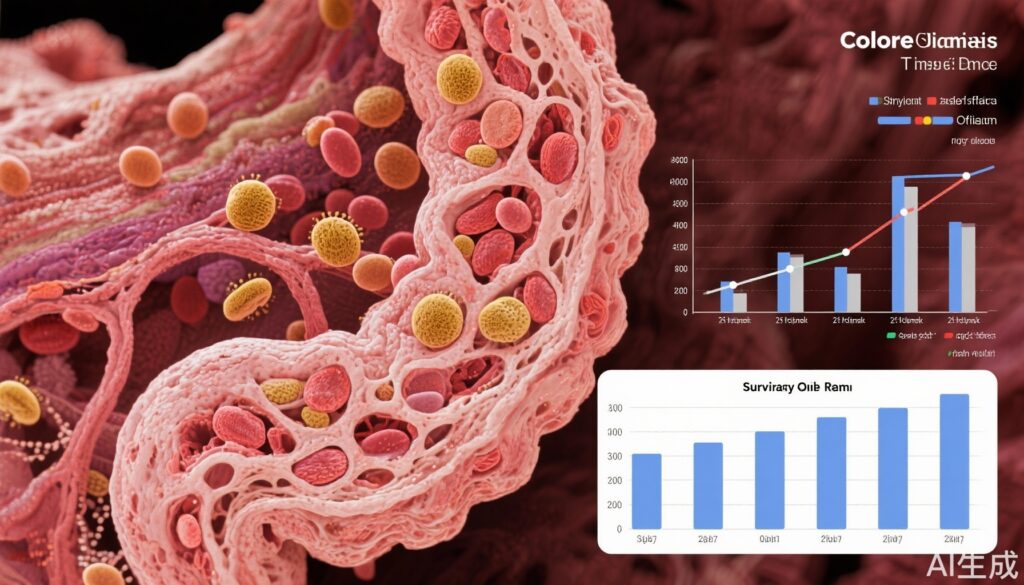Highlight
- Type 2 diabetes (T2D) is linked with increased colorectal cancer (CRC) risk and poorer survival, modulated by tumor immune cell infiltration.
- The Immune Cell Score (ICS), reflecting CD3+ and CD8+ T-cell densities, stratifies CRC tumors into low, intermediate, and high immune infiltration phenotypes influencing diabetes-associated risk.
- T2D particularly elevates CRC risk and worsens CRC-specific and disease-free survival in tumors with low immune infiltration (ICSLow), but not in high immunity subtypes (ICSHi).
- Overall survival in T2D patients is inferior regardless of tumor immune status, underscoring systemic diabetes effects beyond tumor-specific immunity.
Study Background and Disease Burden
Colorectal cancer (CRC) remains a leading cause of cancer morbidity and mortality worldwide. Type 2 diabetes (T2D), characterized by chronic hyperglycemia and insulin resistance, has been increasingly recognized as an important risk factor for CRC development and progression. Epidemiological evidence consistently links T2D with higher CRC incidence and reduced survival, yet the biological mechanisms underlying this association remain incompletely understood.
Immune surveillance and the tumor microenvironment play crucial roles in colorectal carcinogenesis and patient prognosis. Tumor-infiltrating lymphocytes, particularly CD3+ and CD8+ T cells, are established prognostic markers, with high immune infiltration generally correlating with better outcomes. It remains unclear how T2D intersects with tumor immunity to influence CRC risk and survival outcomes.
Understanding whether diabetes modulates CRC through systemic metabolic effects, immune modulation, or their interaction holds potential to refine cancer risk stratification and guide prevention and treatment strategies tailored to metabolic and immunological profiles.
Study Design
This investigation was a large population-based matched case-control study including 4,724 participants, encompassing 2,321 incident CRC cases with a median follow-up of 9.5 years. Tumor immune status was quantified using an Immune Cell Score (ICS) based on densities of CD3+ and CD8+ T cells identified at two sites of the tumor (invasive margin and tumor core) via immunohistochemistry.
ICS categories were defined using cutoffs at the 25th and 70th percentiles, generating three distinct immunological phenotypes: low (ICSLow), intermediate (ICSInt), and high (ICSHi) immune infiltration.
Multivariable logistic regression models evaluated the association of T2D with CRC risk across ICS strata. Time-dependent Cox proportional hazards models assessed T2D’s impact on CRC-specific survival and disease-free survival (DFS), adjusting for potential confounders including age, sex, tumor stage, and comorbidities.
Key Findings
The study revealed significant heterogeneity in the relationship between T2D and CRC risk according to tumor immune infiltration (P for heterogeneity = .02). Overall, T2D was associated with a 39% increased risk of CRC (Odds Ratio [OR], 1.39; 95% CI, 1.17 to 1.66).
When stratified by immune status, this association was strongest in the ICSLow subgroup (OR, 1.80; 95% CI, 1.35 to 2.39), modest in ICSInt tumors (OR, 1.42; 95% CI, 1.17 to 1.66), and non-significant in ICSHi tumors (OR, 1.16; 95% CI, 0.88 to 1.52). This indicates that T2D preferentially increases risk for tumors with poor immune infiltration.
Survival analyses demonstrated that CRC patients with T2D and ICSLow tumors had nearly double the risk of CRC-specific mortality (Hazard Ratio [HR], 1.99; 95% CI, 1.30 to 3.05) and a significantly worse DFS (HR, 1.53; 95% CI, 1.05 to 2.26) compared to non-diabetic counterparts. In contrast, no statistically significant survival differences emerged for ICSInt and ICSHi subtypes.
Across all immune categories, patients with T2D exhibited inferior overall survival and increased non-cancer-related mortality independent of tumor immunity status, reflecting diabetes-related systemic health impacts.
Expert Commentary
These findings illuminate a nuanced interaction between metabolic disease and tumor immunology, suggesting that T2D exacerbates CRC development and progression predominantly when tumors have low immune infiltration. The impaired immune surveillance in these tumors may synergize with the pro-inflammatory, hyperinsulinemic, and immunomodulatory milieu characteristic of T2D to promote tumorigenesis.
This research aligns with mechanistic studies showing that hyperglycemia and insulin resistance can suppress cytotoxic T cell activity and foster an immunosuppressive tumor microenvironment. The lack of association in ICSHi tumors possibly reflects robust anti-tumor immune responses that counterbalance the deleterious metabolic effects of T2D.
Clinically, these data underscore the importance of integrating immune profiling into CRC risk assessment and prognostication among diabetic patients. They reveal an unmet need for precision preventive interventions combining metabolic control and immune modulation.
Limitations include observational design with residual confounding potential, and immune status was assessed only at diagnosis. Further studies should explore dynamic immune-metabolic interactions during cancer progression and therapy.
Conclusion
Type 2 diabetes significantly influences colorectal cancer risk and prognosis in an immune context-dependent manner. Patients with diabetes are at greatest risk of developing and suffering poorer outcomes from CRC tumors characterized by low immune cell infiltration. This suggests a biological continuum whereby diabetes-driven systemic and local immune dysregulation contributes to tumor initiation and progression.
These insights warrant consideration of tumor immune characteristics in the management of CRC patients with T2D and support the development of integrated metabolic and immunotherapeutic strategies aimed at lowering colorectal cancer burden in this high-risk population.
References
Wankhede D, Halama N, Kloor M, Brenner H, Hoffmeister M. Diabetes and Colorectal Cancer Risk and Survival According to Tumor Immunity Status. J Clin Oncol. 2025 Sep 10;43(26):2930-2941. doi: 10.1200/JCO-25-00148. Epub 2025 Jul 14. PMID: 40658916.
Additional relevant literature:
1. Giovannucci E. Insulin and colon cancer. Cancer Causes Control. 1995;6(2):164-179.
2. Galván JA, Gaffney J, López-Soto A, Smyth MJ. Understanding the immunometabolic crosstalk underlying cancer progression. Nat Rev Immunol. 2023;23(4):261-272.
3. Chen YJ, Li CW, Chen PH, et al. Impact of immune infiltration on colorectal cancer survival: A systematic review and meta-analysis. Clin Transl Med. 2022;12(8):e1057.



